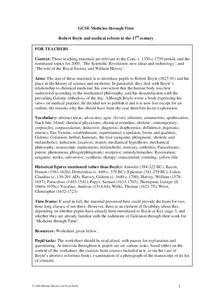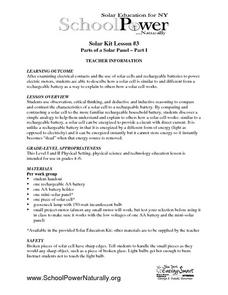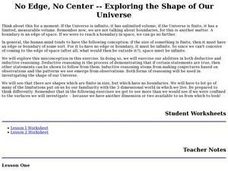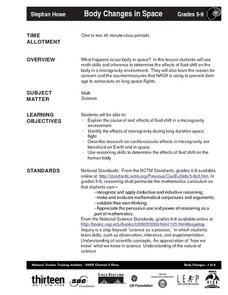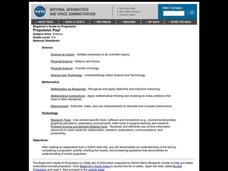Curated OER
Problem-Solving Methods in Biology
In this problem-solving worksheet, students will read a biologist's observations about elephant communication. Students will write down what the biologist observed, what facts she knew about elephants, and her hypothesis. Students will...
Curated OER
Scientific Methods in Biology
In this scientific methods worksheet, students will review the steps necessary in testing a hypothesis including the types of reasoning and variables involved. This worksheet has 6 terms in a crossword puzzle and 4 fill in the blank...
Curated OER
Visible Pulse!
Students demonstrate their understanding of Human Body Systems by showing connections between external and internal body structures and how they help humans survive. They use either deductive or inductive reasoning to explain...
Curated OER
"Croak" Science Mystery
Solve the mystery of a declining frog population! Lead your junior ecologists on an investigation that simulates actual events concerning pollution, predation, poaching, and more. Investigators read a story online, then analyze survey...
Curated OER
Solar Kit Lesson #3 Parts of a Solar Panel - Part I
A solar cell is similar to a rechargeable battery in many ways. Science lab groups connect each in a series circuit to run a mini motor and then compare and contrast them by answering questions and completing a Venn diagram. This is an...
Michael Hunter and Fiona Kisby
Robert Boyle and Medical Reform in the 17th Century
Introduce pupils to the work of Robert Boyle and his influence on medical practice through a series of informational texts and discussion questions.
Curated OER
Is Global Warming Happening?
Students investigate the probability of global warming and the effects of global warming on the environment. They conduct Internet research and collect data, transfer the data onto an Excel spreadsheet, and create a presentation that...
Curated OER
Physics Park
Students research and design a playground for a park or school in their community. They explore the physics concepts that are present in the design and, if applicable promote their ideas to city or school officials.
Curated OER
Parts of a Solar Panel-Part I
Students examine electrical contacts, solar cells, and rechargeable batteries and compare and contrast the characteristics of a solar cell to a rechargeable battery in a hands-on activity. Students complete a worksheet as they...
Curated OER
How the Environment Affects Our Health
Ninth graders explore how the environment affects health. In this infectious disease lesson, 9th graders investigate what environmental situations cause infections diseases. Students study the symptoms, treatments, prevention, and...
Curated OER
No Edge, No Center -- Exploring the Shape of Our Universe
Students examine various "spaces" (including ones that are one-dimensional, two-dimensional, and three-dimensional). For each space, they will examine what it means to have or not have an edge, or to be finite or infinite.
Curated OER
Putting Your Best Foot Forward
Third graders measure their feet and their parents' feet, record data on computer-generated graphs, and calculate and record mean, median, and mode.
Curated OER
What Would You Fly?
Students, after reading an explanation from a NASA Web site, demonstrate an understanding of the text by writing an essay that applies the information found in the slides to a real-life question.
Curated OER
Body Changes in Space
Students explain the cause of and effects of fluid shift in a microgravity
environment. Students identify the effects of microgravity during long duration space flight. Students describe research on cardiovascular effects in microgravity...
Curated OER
What was Newton's Idea of Science?
Students form logical foundations for analysis of observations. They improve analytic reading abilities through practice. Students investigate the foundations of scientific thought processes and how to apply them.
Curated OER
Plant Motion: The Untold Secrets
Students identify and categorize knowledge needed to design an experiment. They observe, recognize and describe the motion viewed. They document any changes caused by various solutions.
Curated OER
Propulsion Pop!
Young scholars demonstrate an understanding of the text by completing a propulsion activity, charting the results, and answering questions that demonstrate an understanding of rocket propulsion.
Sophia Learning
Sophia: Plant Kingdom: Two Approaches to Learn About Nature
Take one of two approaches when investigating nature, using either inductive or deductive reasoning.
Philosophy Pages
Philosophy Pages: Scientific Explanation
Understand how inductive reasoning is used as the structure of scientific explanation, and that it is a deductive argument whose conclusion is the event to be explained.
CK-12 Foundation
Ck 12: Chemistry: Scientific Problem Solving
[Free Registration/Login may be required to access all resource tools.] Describes scientific problem solving and the scientific method.
CK-12 Foundation
Ck 12: Chemistry: Scientific Problem Solving
[Free Registration/Login may be required to access all resource tools.] Introduces the scientific method and presents the difference between a theory and a law.
Sophia Learning
Sophia: Two Approaches to Learn About Nature: Lesson 3
This lesson illustrates the process by which people can learn about the nature of living things. It is 3 of 3 in the series titled "Two Approaches to Learn About Nature."
Sophia Learning
Sophia: Two Approaches to Learn About Nature: Lesson 1
This lesson illustrates the process by which people can learn about the nature of living things. It is 1 of 3 in the series titled "Two Approaches to Learn About Nature."





